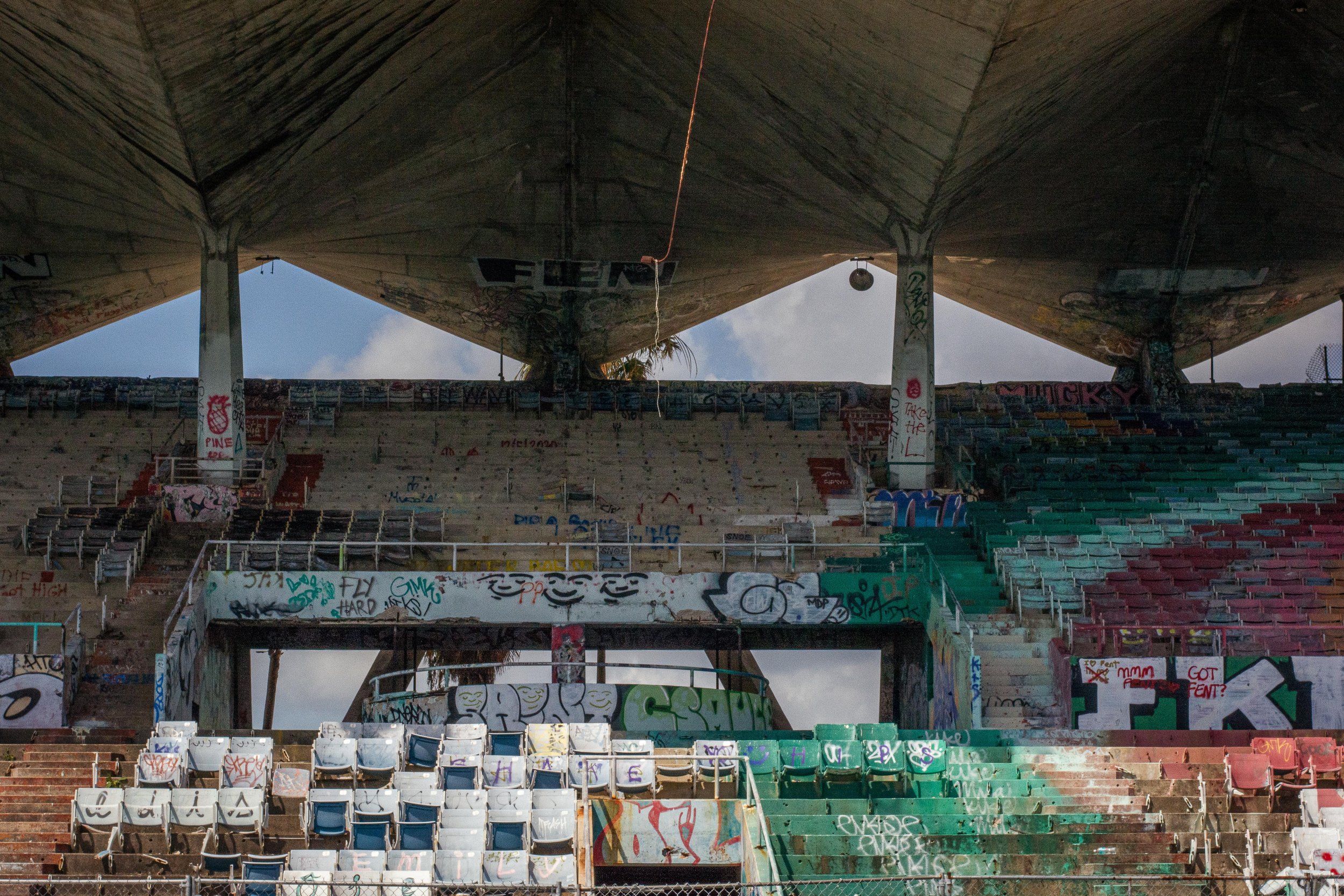A Reflection on the 2024 National Symposium Miami
A Reflection on the 2024 National Symposium Miami
By Jingyi Luo, Recipient of Docomomo US/NOCA Symposium Travel Grant
I am Jingyi Luo, the immensely grateful recipient of the Docomomo US/NOCA Symposium Travel Grant. Thanks to the Grant, I had the pleasure of attending the 2024 National Symposium in Miami. The extensive discussions and site visits that I was able to experience there have greatly inspired me, and enriched my understanding of historical context and the contemporary challenges in preserving modern buildings.
Learning about and experiencing Marine Stadium was the crown jewel of my time in Miami. My introduction to the site began with Don Worth’s passionate lecture on the historical significance of the building, located on Virginia Key and designed by Hilario Candela in 1962. Originally built as a grandstand for speedboat racing, the structure is celebrated for its avant-garde architectural design featuring exposed concrete and hyperbolic-paraboloid shells, inspired by Dulles Airport (designed in 1958, and completed in 1962). However, since its closure following Hurricane Andrew in 1992, it has been left in a state of neglect, serving only as a canvas for graffiti artists, despite its robust construction.
Hilario Candela in front of the stadium construction, 1963. (Alvaro Lamas, “Miami Marine Stadium By Hilario Candela,” July 27, 2016)
Construction photos of Miami Marine Stadium, 1963. (Alvaro Lamas, “Miami Marine Stadium By Hilario Candela,” July 27, 2016)
Speedboats racing in the basin, 1964. (Alvaro Lamas, “Miami Marine Stadium By Hilario Candela,” July 27, 2016)
Evening show, 1971. (Alvaro Lamas, “Miami Marine Stadium By Hilario Candela,” July 27, 2016)
The restoration plans were vividly brought to life through discussions led by Paul Gaudette and Rosa Lowinger. They detailed the meticulous efforts in conservation, focusing on graffiti removal, testing concrete repair mixes, and building envelope coatings. These history and technical sessions were complemented by a boat tour, which provided me with a firsthand view of the challenges and potential of the site, further enriching my understanding and emotional connection to the project.
Current condition. (Jingyi Luo, 2024.)
Current condition. (Jingyi Luo, 2024.)
Current condition. (Jingyi Luo, 2024.)
Current condition. (Jingyi Luo, 2024.)
One aspect that was seldom discussed was the impact of climate change, a topic that surfaced during an audience Q&A for Marine Stadium. This gap was bridged in another session by Jennie Gwin, who presented “Preserving Mission 66 Modernism in an Urban Environment Threatened by Climate Change.” The lecture shared the renovation plan of the National Capital Region Headquarters of the National Park Service. It dove into the details of adaptive reuse strategies that balance historical integrity with sustainability. Gwin highlighted practical approaches like integrating insulated glass units and additional insulation to improve energy efficiency and strategically placing new construction above the floodplain to mitigate flood risks. This project serves as a precedent that demonstrates the practical use of strategies that I learned from my Floodplain Management class during my graduate studies.
Hains Point Campus historic photo. (“National Park Service to Begin Hains Point Campus Renovation.”)
Hains Point Campus renovation. (National Park Service to Begin Hains Point Campus Renovation.)
I am immensely grateful for the support of the Docomomo/NOCA Symposium Travel Grant not only because of the joyful moment of expanding my knowledge and exploring the city, but also for seeing the connection between my education and the real-world projects that others are leading. Thank you!
About the Author
Jingyi Luo is a recent graduate of the University of Pennsylvania’s Weitzman School of Design, where she just received her Master of Science in Historic Preservation in 2024. Her studies focused on architectural conservation, and her master's thesis investigated the effects of climate change on two contemporary bush-hammered concrete buildings by I.M. Pei. Her research focused on two main concrete deterioration mechanisms: surface recession and concrete carbonation, and their combined on-going effects with current and projected changing climates. During her graduate studies, Jingyi interned with CVM Engineers.
Prior to her studies in Philadelphia, Jingyi lived and worked in San Francisco. She received her Bachelor of Architecture from the California College of the Arts (CCA) in 2019. At CCA, she developed interests in architectural theory, construction history, and environmental issues. Her undergraduate project, “Waterline” explored the interpretation of traditional construction knowledge to address climate threats to an island in the Maldives, earning her the AIA Cote Top Ten Student Award in 2020. After her graduation, Jingyi worked at Page & Turnbull, one of the first preservation architecture firms in California, where she participated in projects involving Second Bay Tradition houses and waterfront developments like India Basin, further deepening her dedication to historic preservation and environmental issues.










